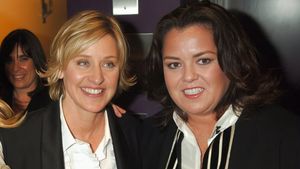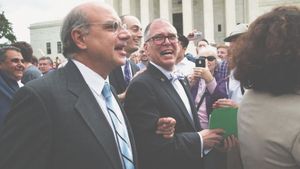Barack Obama's
army of small-dollar donors gave his presidential campaign
its biggest boost in June, contributing more than $30
million in individual sums of $200 or less.
Overall, the
presumed Democratic presidential nominee hauled in $52
million for the month, reversing a three-month fund-raising
decline. He also had his lowest spending of the year,
permitting him to build a $72 million end-of-month
cash reserve.
''This is the
highest amount raised in amounts of $200 or less in the
history of presidential fund-raising,'' said Michael Malbin,
executive director of the Campaign Finance Institute,
a nonpartisan organization that analyzes campaign
money.
By comparison,
Republican rival John McCain raised $21.5 million in June,
with only a third coming from donors who gave in increments
of $200 or less, according to the institute's
analysis.
Obama's total
includes $21 million in contributions from those whose
aggregate donations to his campaign during the past 18
months have not exceeded $200. The campaign does not
have to itemize those donations.
The boost in
giving was a tangible result of clinching the Democratic
presidential nomination on June 3.
That so much of
his money came in small-dollar donations is noteworthy
because it means those contributors are likely to give again
-- an important consideration for Obama, who has
decided to forego $84 million in public money to spend
on the fall campaign.
''These are
enthusiastic people who are likely, if anything, to become
more enthusiastic as the general election campaign becomes
more heated,'' Malbin said.
Sen. Hillary
Rodham Clinton, who suspended her quest for the White House
on June 7, faced a starkly different financial picture. She
lent herself an additional $1 million in June to pay
vendors, increasing her personal loan to the campaign
to $13.2 million. She reported owing vendors $12
million. She raised $2.7 million from donors in June.
Obama reported
spending $25.6 million in June, his lowest monthly
operating costs of the year. McCain disbursed $27 million,
including $1.2 million to a special accounting fund
for the fall campaign.
Unlike McCain,
who spent more than he raised in June, Obama accumulated
cash during the month. While he ruled on the airwaves with
ads during the primary season, he refused to match
McCain's ad spending in June. McCain devoted $16
million to advertising to Obama's $5 million. Obama is now
matching McCain's and the Republican Party's ad spending.
Both sides are
also getting outside help from partisans. The liberal
group MoveOn.org and the American Federation of State,
County and Municipal Employees spent more than
$500,000 on an ad in June that portrayed McCain's Iraq
policy as a prolonged presence that would involve a
new generation of Americans.
This week two
conservative groups began airing anti-Obama ads. One, by
the group Citizens United, is on Fox News promoting a video
documentary of Obama. The ad features former Ohio
secretary of state J. Kenneth Blackwell; the Reverend
Joe Watkins, a Republican strategist; as well as two
television political analysts, Tucker Carlson and former
President Clinton adviser Dick Morris, decrying
Obama's policies and his coverage by the news media.
The second ad, by
a nonprofit group called ''Let Freedom Ring,'' has
secured time on CNN and MSNBC this week to air an ad
depicting Obama as duplicitous. The ad, called ''Both
Ways Barack,'' contends Obama is worse than a
flip-flopper because ''he holds two positions at the same
time.''
Both groups are
organized under IRS rules that permit them to keep their
donors anonymous.
''The principal
reason why our donors wish to remain anonymous is not
because they don't want to be associated with our message,
but because they don't want to become targets for
other fund-raisers,'' said Colin Hanna, the president
of Let Freedom Ring.
The different
financial pictures between Obama and McCain reflect two
distinct strategies by the campaigns. McCain plans to accept
$84 million in public funds for the fall campaign,
which prevents him from raising or spending any money
above that sum.
In deciding to
bypass the public finance system, Obama became the first
major-party presidential candidate in three decades to do so
in the general election. That means he needs to build
up his cash reserves going into the fall, whereas
McCain needs to deplete his.
Obama and McCain,
meanwhile, are still busy raising money, often for
joint victory funds set up with their respective parties.
McCain's
fund-raising is getting a significant boost from the fund
set up with the Republican National Committee.
Overall, the RNC, with the victory fund, raised nearly
$26 million in June. The RNC had nearly $69 million
cash on hand. Though McCain's spending is limited because he
accepted public funds for the fall, the Republican Party can
raise and spend as much as it wants to help him.
Altogether, McCain and the RNC began July with $96
million in the bank.
In clinching the
nomination, Obama also helped the Democratic National
Committee raise money. The DNC and two victory funds it set
up raised $24.2 million in June and had $20.4 million
on hand. Obama and the party had $92 million in the
bank at the start of July.
Clinton's
decision to lend herself $1 million on June 30 underscored
her struggle raising money.
Obama has asked
his donors to help her reduce her debt. A joint
fund-raising event in New York earlier this month brought in
about half a million dollars for Obama and about half
as much for Clinton, according to fund-raisers.
Clinton's biggest single debt was $5.3 million to her
senior adviser and pollster Mark Penn, but aides said she
intends to pay off smaller vendors first. (Jim
Kuhnhenn, AP)














































































